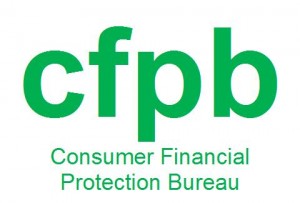By: Jeffrey B. Lapin
The Consumer Financial Protection Bureau (CFPB), has now been in existence for fourteen (14) months. It was created as part of the 2010 Dodd–Frank Wall Street Reform and Consumer Protection Act. So far, the CFPB has been praised by consumer advocates and criticized by businesses.
OVERVIEW OF THE CFPB
The Consumer Financial Protection Bureau has significant power over money transfers, foreclosures, payday loans and virtually every other financial product or service used by consumers. This power includes regulating debt collection and enforcing and punishing violations of the Fair Debt Collection Practices Act (FDCPA), which had previously been handled by the Federal Trade Commission (FTC).
The CFPB’s website declares its goals, purposes and mission:
The consumer bureau is working to:
Educate: An informed consumer is the first line of defense against abusive practices.
Enforce: Like a neighborhood cop on the beat, the CFPB supervises banks, credit unions, and other financial companies, and we will enforce Federal consumer financial laws.
Study: The consumer bureau gathers and analyzes available information to better understand consumers, financial services providers, and consumer financial markets.Above all, this means ensuring that consumers get the information they need to make the financial decisions they believe are best for themselves and their families—that prices are clear up front, that risks are visible, and that nothing is buried in fine print. In a market that works, consumers should be able to make direct comparisons among products and no provider should be able to build, or feel pressure to build, a business model around unfair, deceptive, or abusive practices.
Source: Inside the CFPB | About Us.
 Richard Cordray is the acting Director of the CFPB. Information about Richard Cordrey is available on the CFPB’s website: About Richard Cordray. Since his appointment he has caused the CFPB to be very active in developing and proposing rules and regulations, investigating and issuing subpoenas against businesses they may be violating consumer protection laws as well as initiating civil enforcement actions.
Richard Cordray is the acting Director of the CFPB. Information about Richard Cordrey is available on the CFPB’s website: About Richard Cordray. Since his appointment he has caused the CFPB to be very active in developing and proposing rules and regulations, investigating and issuing subpoenas against businesses they may be violating consumer protection laws as well as initiating civil enforcement actions.
The CFPB does not have the power to criminally indict people or companies. Those cases are referred to the Department of Justice. However, the CFPB still does have significant power as it can file civil charges, request that injunctions be imposed and either request fines or that companies issue refunds to consumers.
THE CFPB’S FIRST 14 MONTH
The Consumer Financial Protection Bureau has done a lot in its first 14 months including:
- Examine payday lending (Consumer Financial Protection Bureau examines payday lending);
- Proposed rules setting forth which debt collection companies and consumer reporting markets it will supervise (Consumer Financial Protection Bureau proposes rule to supervise larger participants in consumer debt collection and consumer reporting markets);
- Creating a Consumer Complaint Database (Consumer Financial Protection Bureau launches Consumer Complaint Database);
- Proposing “Know Before You Owe” mortgage forms (Consumer Financial Protection Bureau proposes “Know Before You Owe” mortgage forms);
- Getting Capital One to pay $140 million to consumers over some of its marketing practices (CFPB probe into Capital One credit card marketing results in $140 million consumer refund);
- Won a temporary restraining order against two Californians who allegedly preyed on at-risk homeowners in more than 25 states by promising people they could prevent foreclosures and charged thousands in illegal, upfront fees.
These are just some of what the CFPB has done in 2012. You can find press releases, op-eds and speeches and testimonies on the CFPB’s website: Inside the Bureau | Newsroom.
RECENT COMMENTS ABOUT THE CFPB
A September 12, 2012, article from USA Today, Consumer regulator barks; an industry shudders, discusses the CFPB and its impact so far. The article quotes a CFPB official, proponents and critics. Here is what some of these individuals said:
- Kent Markus (CFPB’s head of enforcement office): “We [the CFPB] want to make it more expensive to break the law than to abide by it.”
- Jack Conway (the Attorney General of Kentucky): “The CFPB is a new animal, and they have to establish their turf and a way of doing business.”
- Jonathan Pompan (an attorney who represents companies being investigated by the CFPB: “It’s the FTC on steroids.”
- Elizabeth Warren (Democratic candidate for the U.S. Senate from Massachusetts who is credited with proposing the CFPB): “It’s a sober agency. It’s a careful agency. But it’s not timid.”
- Bill Himpler (Vice President of the American Financial Services Association, a trade group for card companies, mortgage lenders and finance companies): “It doesn’t leave somebody with the best feeling that what they’re trying to do is ensure compliance so much as create a gotcha situation.”
The USA Today article also stated:
More than two dozen interviews with agency officials and industry executives offered sweeping insight into the new agency’s behind-the-scenes efforts, which have taken the financial industry off guard and have been far more aggressive than previously known.
The number of subpoenas and probes was confirmed by agency, industry and trade group officials who spoke to The Associated Press on condition of anonymity because the subpoenas bar both sides from discussing them.
The bureau’s actions have many banks, payday lenders and credit card companies racing to adjust. They’re tightening their record-keeping and budgeting for defense lawyers, according to attorneys and trade group executives who work with them. The companies themselves are reluctant to discuss the bureau because they don’t want to be seen as criticizing a regulator that is still choosing its battles.
All of these remarks demonstrate that the CFPB is recognized as an important government agency that is trying to implement its mission and justify its creation.
THE CFPB’S FUTURE
As the CFPB is only 14 months old, it’s procedures, rules and methods are being developed and revised. It is also exercising its regulatory powers and creating new rules and regulations for various financial products or services used by consumers. The CFPB also continues to investigate companies that it believes are violating consumer rights.
PRIOR LAPIN LAW OFFICES’ POSTS ABOUT THE CFPB
CFPB Launches Consumer Complaint Database
CFPB Proposes Rule to Define “Larger Participants” It Will Monitor
The Consumer Financial Protection Bureau (CFPB) – Will It Be Better for Consumers or Debt Collectors?
ABOUT LAPIN LAW OFFICES
 Lapin Law Offices represents clients throughout Nebraska against debt collectors that threaten, abuse, harass or violate a consumer’s rights. Even if you owe money, the law protects you from these unlawful tactics. You can learn more by calling us at 402-421-8033 or through our websites: Lapin Law Offices or StopBadCollectors.com. We offer a free consultation and do not charge a fee unless we collect money for you.
Lapin Law Offices represents clients throughout Nebraska against debt collectors that threaten, abuse, harass or violate a consumer’s rights. Even if you owe money, the law protects you from these unlawful tactics. You can learn more by calling us at 402-421-8033 or through our websites: Lapin Law Offices or StopBadCollectors.com. We offer a free consultation and do not charge a fee unless we collect money for you.
